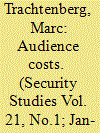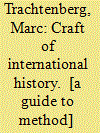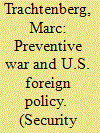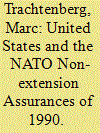|
|
|
Sort Order |
|
|
|
Items / Page
|
|
|
|
|
|
|
| Srl | Item |
| 1 |
ID:
111585


|
|
|
|
|
| Publication |
2012.
|
| Summary/Abstract |
This article examines the argument that the ability of a government to generate "audience costs"-to create a situation, that is, in which it would pay a domestic political price for backing down-plays a key role in determining how international crises run their course. It does this by looking at a dozen great power crises to see how well various aspects of the audience costs argument hold up in the light of the historical evidence. The audience costs mechanism, it turns out, does not play a major role in any of those crises-a conclusion which, the author claims, has certain important methodological implications.
|
|
|
|
|
|
|
|
|
|
|
|
|
|
|
|
| 2 |
ID:
072751


|
|
|
|
|
| Publication |
Princeton, Princeton University Press, 2006.
|
| Description |
x, 266p.
|
| Standard Number |
0691125015
|
|
|
|
|
|
|
|
|
|
|
|
Copies: C:1/I:0,R:0,Q:0
Circulation
| Accession# | Call# | Current Location | Status | Policy | Location |
| 051412 | 327.0722/TRA 051412 | Main | On Shelf | General | |
|
|
|
|
| 3 |
ID:
001508


|
|
|
|
|
| Publication |
Princeton, University Press, 1991.
|
| Description |
xii, 292p.
|
| Standard Number |
0691023433
|
|
|
|
|
|
|
|
|
|
|
|
Copies: C:1/I:0,R:0,Q:0
Circulation
| Accession# | Call# | Current Location | Status | Policy | Location |
| 041060 | 355.4/TRA 041060 | Main | On Shelf | General | |
|
|
|
|
| 4 |
ID:
076998


|
|
|
|
|
| Publication |
2007.
|
| Summary/Abstract |
This article examines the claim that the Bush strategy of dealing with developing threats "preemptively" marked a total break with American tradition. It turns out that preventive war thinking played a much greater role in shaping u.s. policy than most people realize. During the early Cold War period, this sort of thinking was by no means limited to the lunatic fringe. Could the United States simply sit back and allow first the Soviets and then the Chinese to develop nuclear capabilities of their own? Many people, both inside and outside the government, were worried about what would happen if America did nothing and thought that the possibility of preventive action had to be taken seriously. In the post-Cold War period, the Clinton administration seemed ready to do whatever was necessary to prevent North Korea from going nuclear; it seemed prepared, in fact, to go to war over the issue. Even in the pre-nuclear world, preventive war thinking played a major role in shaping policy: American policy in 1941 was strongly influenced by this kind of thinking.
|
|
|
|
|
|
|
|
|
|
|
|
|
|
|
|
| 5 |
ID:
058436


|
|
|
| 6 |
ID:
181024


|
|
|
|
|
| Summary/Abstract |
Claims about Soviet policy at the end of the October 1973 Arab-Israeli war played a key role in discrediting détente in the mid- and late 1970s. This analysis considers the part that Henry Kissinger played in triggering the Soviet actions at the end of the war to which the critics of détente pointed. Contrary to what Kissinger claimed, he essentially reneged on the agreement he had reached with the Soviet leadership to end the war and instead directly encouraged the Israelis to continue military operations well after the ceasefire was supposed to take effect. That, in turn, led to a crisis that had a profound effect on Soviet-American relations for years to come.
|
|
|
|
|
|
|
|
|
|
|
|
|
|
|
|
| 7 |
ID:
176513


|
|
|
|
|
| Summary/Abstract |
The Russian government has claimed that the Western powers promised at the end of the Cold War not to expand NATO, but later reneged on that promise. Most former officials in the West, and many scholars as well, have denied that this was the case; but other scholars, along with a handful of former officials, believe that promises to that effect were, in fact, made in 1990. So who is right? The question still has political importance: how it is answered has bearing on how we should feel about NATO expansion and, indeed, about the United States' post–Cold War policy more generally. So it makes sense to stand back and try to see where the truth lies. An examination of the debate in light of the evidence—especially evidence that the participants themselves have presented—leads to the conclusion that the Russian allegations are by no means baseless, which affects how the U.S.-Russian relationship today is to be understood.
|
|
|
|
|
|
|
|
|
|
|
|
|
|
|
|
|
|
|
|
|